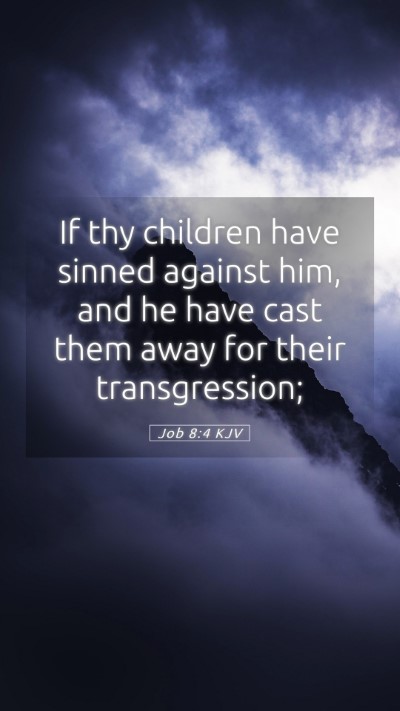Old Testament
Genesis Exodus Leviticus Numbers Deuteronomy Joshua Judges Ruth 1 Samuel 2 Samuel 1 Kings 2 Kings 1 Chronicles 2 Chronicles Ezra Nehemiah Esther Job Psalms Proverbs Ecclesiastes Song of Solomon Isaiah Jeremiah Lamentations Ezekiel Daniel Hosea Joel Amos Obadiah Jonah Micah Nahum Habakkuk Zephaniah Haggai Zechariah MalachiJob 8:4 Meaning
What is the meaning of Job 8:4?
If thy children have sinned against him, and he have cast them away for their transgression;
Job 8:4 Bible Verse Meaning
Understanding Job 8:4
Job 8:4 states: "If your children have sinned against Him, He has cast them away for their transgression."
Bible Verse Meanings
This verse, articulated by Bildad the Shuhite, reflects an interpretation of divine justice. His statement suggests that suffering is often a direct consequence of sin, adhering to the belief prevalent in ancient wisdom literature that the righteous prosper while the wicked suffer.
Bible Verse Interpretations
From various commentaries, Job 8:4 suggests that Bildad was seeking to establish a cause-and-effect relationship between sin and misfortune. His assertion places the blame for Job's suffering squarely on possible sins committed by Job's children, which demonstrates a rigid view of divine justice.
Bible Verse Understanding
Understanding this verse is crucial in acknowledging the worldview of its speakers. Bildad's stance represents a common belief in retributive justice that assumes all suffering results from personal sin, a view that is increasingly challenged throughout the book of Job.
Bible Verse Explanations
In the broader context of the Book of Job, this assertion by Bildad is one of many attempts to explain Job's immense suffering. Instead of comforting Job, Bildad's words seem to taunt him, suggesting that his children's demise was deserved due to their sins.
Commentary Insights
-
Matthew Henry:
Henry emphasizes that Bildad's argument lacks compassion. He highlights the danger of assuming that suffering is always a result of sin. This perspective can lead to false conclusions about God's character and the nature of suffering.
-
Albert Barnes:
Barnes points out the theological implications of this verse, noting that it illustrates the prevailing belief in the strict justice of God. He cautions against the simplistic reasoning presented by Bildad, as it fails to recognize the complexities of God's mercy and justice.
-
Adam Clarke:
Clarke elaborates on the implications of Bildad's statement, emphasizing that such reasoning can lead to despair for the innocent. He argues that it is essential to view the trials of Job through a lens of spiritual testing rather than mere punishment.
Application of Job 8:4
This verse has practical applications in Bible study and personal reflection. It challenges readers to think critically about the relationship between sin and suffering. For modern believers, it invites exploration of grace, mercy, and the experiences of unjust suffering.
Cross References
- Proverbs 11:21: "Though they join forces, the wicked will not go unpunished; but the posterity of the righteous will be delivered."
- Job 1:5: "And when the days of feasting had run their course, Job would send and sanctify them, and he would rise early in the morning and offer burnt offerings according to the number of them all."
- Lamentations 3:39: "Why should a living man complain, a man for the punishment of his sins?"
- Galatians 6:7: "Do not be deceived: God is not mocked, for whatever one sows, that will he also reap."
Conclusion
In conclusion, Job 8:4 serves as a pivotal reflection on the nature of suffering and divine justice. Its implications remind readers of the complex relationship between sin, punishment, and grace, urging a deeper understanding of Scripture and the character of God.


